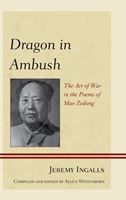Dragon in Ambush: The Art of War in the Poems of Mao Zedong
Publisher:
Lexington
Publication:
6/2013
Languages:
English
Binding:
Hardcover
ISBN/SKU:
9780739177822
Pages:
498
Sizes:
235 x 160mm
Weight:
0.8000
On OrderTo be dispatched within 1 week
£57.95
£57.95
(€64.90)
Dragon in Ambush by Jeremy Ingalls is a critique and new translation of the first twenty poems of Mao Zedong’s published poetry. This seminal work stands out from previous translations of Mao’s poems in seeing them as an expression of his core political beliefs, rather than for their poetic effect. Instead, Dr. Ingalls shows in consummate detail that Mao was careful and deliberate in employing imagery in his poetry to lay out procedures for political supremacy in which the central drive was his will to psychological domination. That is, domination of the minds of others is the unifying theme of Mao’s verse-sequence.
The crux of Prof. Ingalls’ work lies in her focus on the symbolism in the poems. The poems are, in Mao’s use of them as a means of communication, meaningless on their surface. No image, however seemingly commonplace, is ever employed for merely lyrical or aesthetic description. Every image functions as a factor in an entirely political calculus. According to Dr. Ingalls, 'When Mao mentions streams or mountains, suns or moons, clouds or winds or icicles, horses, elephants, snakes, tigers, leopards or bears, specifies kinds of trees or birds or fish, flies, brooms, mats or bridges, these and all his other images have, as their primary function, neither happenstance descriptions nor whimsical metaphor. They all have politically symbolic functions in Mao’s algebra of versified political discourse.'
Furthermore, in her analysis, Prof. Ingalls downplays the significance of Marxism-Leninism in the Thought of Mao Zedong. She shows that throughout his career, Mao regarded Marxism-Leninism as a political convenience, not as a doctrine permanently essential to his master-plan. Just as Mao used the Nationalists of Chiang Kai-shek and Stalin’s Soviet Union as means to further his own political ambitions, so did he manipulate Marxist-Leninist ideology to hoodwink and attract, at home and abroad, professional revolutionaries to help do his bidding. Mao’s aims express, in their worldviews, an entirely Chinese tradition. In his poems Mao’s dialectics, his materialism, and his authoritarianism all take their points of reference from within the Chinese cultural order. Dragon in Ambush is a thoroughly unique and revolutionary approach to understanding the Mind of Mao Zedong.
The crux of Prof. Ingalls’ work lies in her focus on the symbolism in the poems. The poems are, in Mao’s use of them as a means of communication, meaningless on their surface. No image, however seemingly commonplace, is ever employed for merely lyrical or aesthetic description. Every image functions as a factor in an entirely political calculus. According to Dr. Ingalls, 'When Mao mentions streams or mountains, suns or moons, clouds or winds or icicles, horses, elephants, snakes, tigers, leopards or bears, specifies kinds of trees or birds or fish, flies, brooms, mats or bridges, these and all his other images have, as their primary function, neither happenstance descriptions nor whimsical metaphor. They all have politically symbolic functions in Mao’s algebra of versified political discourse.'
Furthermore, in her analysis, Prof. Ingalls downplays the significance of Marxism-Leninism in the Thought of Mao Zedong. She shows that throughout his career, Mao regarded Marxism-Leninism as a political convenience, not as a doctrine permanently essential to his master-plan. Just as Mao used the Nationalists of Chiang Kai-shek and Stalin’s Soviet Union as means to further his own political ambitions, so did he manipulate Marxist-Leninist ideology to hoodwink and attract, at home and abroad, professional revolutionaries to help do his bidding. Mao’s aims express, in their worldviews, an entirely Chinese tradition. In his poems Mao’s dialectics, his materialism, and his authoritarianism all take their points of reference from within the Chinese cultural order. Dragon in Ambush is a thoroughly unique and revolutionary approach to understanding the Mind of Mao Zedong.




